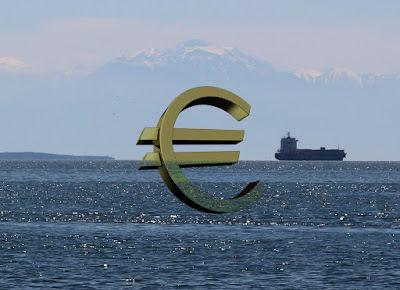European property market could bring the euro down with it
European property crash could bring the euro down with it
09/05/2007

"The European Central
Bank didn't worry about prices on the way up so there is no reason to imagine it will worry about them going down"
In the eight years since the euro was launched, soaring, runaway property markets in Spain, France, and, most of all, Ireland have been seen as one of the greatest threats to the stability of the currency. Now it turns out that precisely the opposite might be true. It is not rising house prices that are a threat to the euro. It is falling prices.
Why? Because as property markets in those three countries start to collapse – as they now appear to be on the edge of doing – the European Central Bank (ECB) will be able to do nothing about it.
Economies may be plunged into recession, financial systems hit, and people's wealth wiped out. And the central bank will be able to do nothing except sit on its hands and fret.
In the past few years, a small number of eurozone countries have seen property inflation that even Londoners might regard as rampant. Now that is going into reverse.
In Ireland, for example, average house prices dropped in April for the first time in five years. The average Irish house now costs E309,071 (£210,399, $418,549), according to figures from the Irish Life & Permanent (slightly more than the £194,362 that the average British house now costs – which just shows what a policy of aggressively lowering taxes can do for an economy).
Contrast that with the recent record. With low interest rates and a booming economy, Irish house prices climbed 335% from 1995 to 2005, according to a survey by the Organisation for Economic Cooperation and Development. That was the fastest rate of any of the 18 countries it looked at.
Next take a look at Spain. A country that for the past few years has been a forest of cranes suddenly has a very wobbly property market. Prices haven't started falling – yet. But the shares of developers and builders have been crashing, a certain sign of trouble ahead.
Or take France, another market that has witnessed strong growth in the past few years. Housing starts dropped 15% in the three months to February, the biggest decline in six years. Apartment prices in Paris are rising at the slowest pace in seven years. That's hardly a sign of a healthy property market.
In truth, there is no great mystery about why the property markets in all three countries have boomed. The ECB in Frankfurt was setting interest rates for the entire euro area.
The bank was mainly paying attention to the depressed German economy. For Ireland and Spain, and probably for France as well, interest rates were far too low given the state of the domestic economies.
For a comparison, just think what would have happened to house prices in Britain if interest rates had been pushed all the way down to 2%. Now we are seeing the flip-side of that. Just as the euro created the boom, now it is creating the bust. Why? Because just as interest rates were too low in those countries for much of the past five years, over the next few years they are going to be too high.
In the current rate tightening cycle, the ECB has raised rates seven times, taking them all the way up from just 2% to the current 3.75%. It is unlikely to stop there – at least one and perhaps two more rate hikes are pencilled in, taking rates up to 4.25% or more.
That means mortgage payments have almost doubled – so it is no great surprise that house prices have started to weaken. The trouble is, there is not a great deal the ECB can do about it.
To start with, there is absolutely no evidence that the ECB pays much attention to house prices. In its monthly bulletins it refers to them only in passing. In key countries such as Germany, there is hardly even any accurate data on the property market (although since prices haven't shifted for 20 years probably nobody can be bothered). The ECB didn't worry about Irish or Spanish house prices when they were on the way up so there is no reason to imagine it is going to start worrying about them when they are on the way down either.
In reality, the ECB will press ahead with its rate rises, with no regard to property prices. But falling house prices will hit the economies of these countries hard. Ireland's Economic and Social Research Institute reckons sliding property prices will take economic growth down to a 15-year low of 3.9%. Property markets are driven by expectations. Once prices start falling, it is very hard to stop them falling – let alone get them moving up again.
Likewise in Spain and France, a collapse of the housing market could well take the economy down with it. In the US or in Britain, if there was a risk of a serious property market crash, the Federal Reserve or the Bank of England would step in with cuts in interest rates. Too much would be at stake to let the market collapse.
When prices were soaring, people probably knew the ECB was to blame, but they could live with it. After all, people were getting richer, and nobody minds that. In the next couple of years, homeowners in Spain, France and Ireland will be getting a lot poorer. And they'll know the ECB is to blame for that as well.
Can it be long before at least some of them start wondering why they haven't got their own central bank?
The Business


Comments
Post a Comment